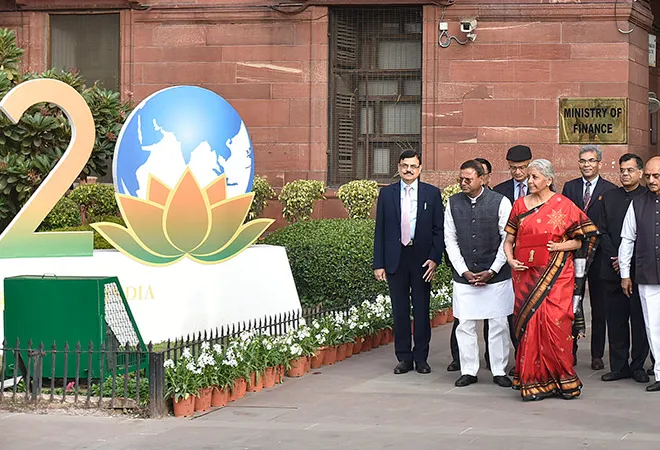-
CENTRES
Progammes & Centres
Location
G20 India aims to provide a global approach to realising common aspirations like a just green transition, renewed forms of multilateralism, digital and financial inclusion, and the vision of sustainable lifestyles

This piece is part of the essay series, Amrit Kaal 1.0: Budget 2023
The global economic landscape is fraught with critical challenges emanating from the triple crises the world has witnessed since 2020—the economic meltdown induced by the COVID-19 pandemic; the Russia-Ukraine conflict creating shortages and driving up prices of food, fuel and fertiliser (the 3Fs); and the rising global inflationary trends and potential financial contagion. All have had adverse impacts across regions and key sectors of economies. India was no exception.
But, while most countries continue to reel under these pressures, the Indian economy seems likely to have moved forward. Leveraging its growth drivers and prioritising critical challenges in the global and domestic sectors through deliberate policy action, the Indian economy has exhibited a remarkable recovery. However, it remains to be seen if the 2023 Union Budget can enable the country to continue to lead by example. While the Indian G20 Presidency upholds the ideas of inclusivity and sustainability for economies worldwide, Budget 2023’s outlook towards meeting the aspirations of the Indian people is crucial.
Leveraging its growth drivers and prioritising critical challenges in the global and domestic sectors through deliberate policy action, the Indian economy has exhibited a remarkable recovery.
India’s Growth Prospects and the Multiplier Effect
Comparable estimates and projections from the World Economic Outlook posit India as a ‘bright spot’ amid this global economic conundrum. India’s Gross Domestic Product (GDP) contracted by 6.6 percent in FY 2020-2021, compared to only -3 percent, -4.4 percent and -1.9 percent GDP growth rates for the world, advanced, and emerging economies, respectively. However, the country has shown significant economic resilience – consistently recording positive and higher growth figures than the world, advanced and emerging economies over the past two years.
The trend will likely continue in FY 2023-24, with India’s GDP projected to grow at 6.1 percent. The Economic Survey 2022-23 highlights that the country is all set to surpass its pre-pandemic growth rates over the next fiscal year. However, to ensure that the growth achieved is broad-based, India will have to address some critical challenges in its domestic sector – high income and wealth inequality and limited public investments in the social sector, which are needed for long-term capacity building. The Union Budget for this fiscal year intends to address these to some extent.
One of the major highlights of this year’s budget was the reforms introduced in the personal income tax regime. Under the new income tax regime, annual income up to INR 7 lakhs will be subject to a rebate, the tax exemption limit has been increased from INR 2.5 lakhs to INR 3 lakhs annual income, and the standard deduction limit has been raised for particular income groups. In addition, measures will also be introduced to manage indirect taxation. The Finance Minister, during her speech, announced that these reforms would result in an estimated INR 370 billion loss in revenue annually. However, this would imply a commensurate increase in the disposable income of the Indian masses – likely to boost consumption demand and economic growth in the country. Moreover, given that the tax reliefs are primarily targeted towards the poor and the middle-class population, with a relatively higher marginal propensity to consume from the domestic markets, the multiplier effect will also be higher.
However, to ensure that the growth achieved is broad-based, India will have to address some critical challenges in its domestic sector – high income and wealth inequality and limited public investments in the social sector.
Another avenue through which the multiplier effect is likely to kick in is through the massive capital expenditure laid out in this year’s budget. The capex outlay for FY 2023-24 was hiked by 33 percent to INR 10 trillion to provide a massive infra boost, which will be instrumental for economic growth, job creation, and incentivising private investment flows. These budget estimates offer a promising outlook for the Indian economy. But whether it hurts the targets set for fiscal consolidation can be anybody’s call.
From Growth to People-centric Development: India’s Domestic and G20 Priorities
Broadening the myopic growth vision, this year’s budget aims to ensure inclusive development with a people-centric approach. This can be provided by facilitating ample opportunities for fulfilling people’s aspirations (especially for the country’s youth), boosting growth and job creation, and securing macroeconomic stability in the medium and long run.
For this purpose, it envisions four primary pillars of strength for “India@100”. First, the promotion of women’s economic empowerment, enabling women to scale up and diversify their entrepreneurial ventures; second, improvements in the quality and scale of business operations of Indian arts and handicrafts and allowing them greater integration into the domestic and global value chains for self-reliance; third, boosting tourism through local community engagements, the convergence of public programmes and robust public-private partnerships for enhancing inclusive growth through a bottom-up approach, and fourth, but most important, enabling just green transitions for reducing the carbon intensity of its economic growth.
G20 India aims to provide a global approach to realising common aspirations like a just green transition, resilience to structural economic vulnerabilities in the real economy and financial sector, renewed forms of multilateralism, digital and financial inclusion of all, and most importantly, the vision of sustainable lifestyles.
The Union Budget 2023, therefore, highlights seven priorities for the domestic economy – inclusive development; growth in infrastructure and investment; physical and digital connectivity for last-mile delivery; harnessing the demographic dividend for maximum benefit; unleashing the potential of key sectors such as MSME industries, agriculture and fisheries, pharmaceuticals, science and technology; making the financial sector more responsible for driving economic growth and ensuring its resilience, and leading the global agenda on green growth, just transitions, and climate action.
2023 is a crucial year for India on the global stage and fulfilling its domestic aspirations will play a critical role. G20 India aims to provide a global approach to realising common aspirations like a just green transition, resilience to structural economic vulnerabilities in the real economy and financial sector, renewed forms of multilateralism, digital and financial inclusion of all, and most importantly, the vision of sustainable lifestyles. These priorities converge well with India’s domestic aspirations. As such, achievement of the targets set out in the Union Budget can lead to domestic capacity building and provide useful learnings that India can utilise to drive global consensus and facilitate solutions to these critical concerns of the world economy. This can provide an effective boost to the Indian G20 presidency and further propel its position up the rungs of the global economic ladder. By establishing and facilitating close partnerships among the G20 and harnessing this opportunity to uphold the pressing problems of the developing world on a global platform, India can play a decisive role in ensuring people-centric development. How effectively India meets its aspirations in the domestic arena and what it beholds for the world – time alone will tell.
The views expressed above belong to the author(s). ORF research and analyses now available on Telegram! Click here to access our curated content — blogs, longforms and interviews.

Debosmita Sarkar is an Associate Fellow with the SDGs and Inclusive Growth programme at the Centre for New Economic Diplomacy at Observer Research Foundation, India. Her ...
Read More +